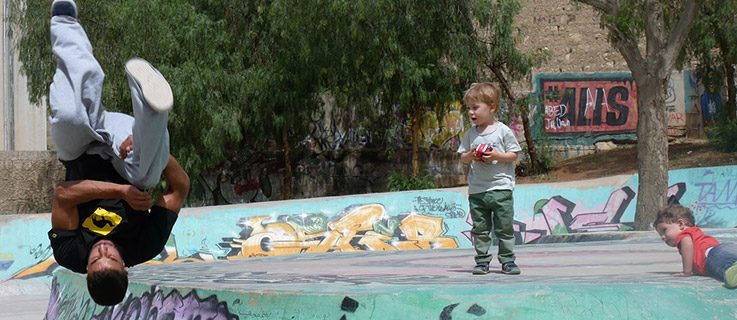A resourceful skater is on a mission to develop public spaces in Amman. This is the story of Jordan’s first skate park.
Working in a cubicle as a programmer felt like a life sentence to 30-year-old Mohammed Zakaria. He only served three-years, though, years that paid well enough to make his dream a reality. “I have always wanted to follow my heart,” says the gangly young man as he gets on his board. Zakaria has been skateboarding since he was ten years old. He doesn’t get to skate much anymore, so he relishes this chance to hit the halfpipe for a photo-op. The skate park in Downtown Amman is his doing – and the reason he doesn’t have much time these days.
Finally, a place for the kids
Almost 7,000 square feet of ramps, edges, halfpipes, and other obstacles sit in the middle of a sun-singed open space: It is a dream come true for Amman’s skaters and bikers. When the scorching sun relents a little in the late afternoon, dozens of kids flock to the park to hang out or to pursue their sports – without getting in trouble with pedestrians or the police.
“We were always in the way,” Zakaria remembers his own youth on four wheels. “There are virtually no public places in Amman where you can skate, bike, dance hip-hop or do pretty much any sports without bothering someone.” The only public spaces that exist are either urban wastelands, garbage dumps, or undeveloped spaces that people use as garbage dumps. But he does not want to complain.
Zakaria presented his plans for a public skate park at the town hall and found a dedicated project partner in German NGO Make Life Skate Life. The city officials approved the park on the condition that it would not cost them anything, yet would be a municipal, openly accessible facility, conveniently located and easy to reach for the greatest possible number of kids. Hence, the perfect spot for it was the corner of the Balat quarter where upscale West Amman borders on poor East Amman.
Rallying the international skater community
From the intersection in front of the park, a road leads up to the artsy nightlife quarter that is currently hip in the Jordanian capital. Galleries and cafés line the narrow streets, you hear more English spoken in the streets than Arabic, brightly colored plant pots sit on sidewalks and hang from lantern posts. Refugees live at the bottom of the hill, the Palestinians have been here for decades, whereas the Iraqi, Syrian, and Somali families have arrived in recent years. The lanes are narrow and full of rubble. A huge portrait of King Abdullah is displayed on the nearby school. Across the street, three men are sitting on rubber tires, working on old cars with dirty hands. Residents are busy hanging their laundry on flat roofs, looking down upon the skaters, graffiti artists, break-dancers, and bikers below.
The 7Hills Skatepark, named after the seven hills on which Amman was originally built, opened on December 27, 2014 – three months after the crowdfunding campaign had cashed in the last dollar, dinar, or euro. The campaign exceeded its goal of 18,500 dollars, raising a total of 23,000 $ (approximately 20,000 €). Skaters from all over the world made donations to make this project a reality.
The construction phase was one big party already, Zakaria remembers. “It was really cool that so many people helped build the park, we had so much fun together.” Volunteers from Germany, England, the Czech Republic, and Algeria came to Amman to help dig and pour concrete. The neighbors lent a hand, as well. Even the imam from the mosque on the other side of the hill came over to high five everybody, Zakarik tells us with a grin.
More sports parks for Amman
Jordan’s first skate park quickly became a melting pot of youth culture, as Zakaria calls it. They held competitions where the kids could win skateboards, which was a huge draw for kids from East Amman, in particular. “7Hills” is skillfully graffitied onto a stone hut that initially served as a skateboard rental station. When kids kept burglarizing the rental hut – “it happens,” Zakaria says with a shrug – he simply gave every boy who regularly showed up his own board. Many of his boards had been donations, anyway. The thefts stopped and Zakaria was free to focus on new projects. In cooperation with a local refugee organization, he launched a skating project for girls from Syria and Iraq and held a culture festival in the skating bowl.
Zakaria, who prefers to be addressed by his last name, because there are ‘simply too many Mohammeds out there’, is a father figure to many of the kids despite his youthful demeanor. He chats with them, encourages them, sets them straight when necessary. One thing he still hasn’t figured out is how to get them to stop littering and use the garbage bins. “The first thing I do whenever I come here is give everybody a broom and get them to clean up – which they do without complaining.”
Zakaria would love to stop by more often, but meanwhile, he has started his own skateboard business that produces boards in Canada and then imports them to Jordan. He hopes to start manufacturing boards in Jordan soon. He also wants to open a skating school at the 7Hill Park and teach lessons himself every once in a while. It is doubtful whether he will find the time to do that. Even now he is on his way to the town hall again. If all works out, Amman will soon have another new sports park.
